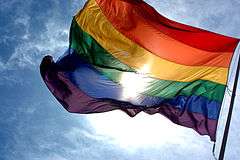Albert Kennedy Trust
 Albert Kennedy Trust logo | |
| Founded | 1989 |
|---|---|
| Focus | Homeless LGBT youth |
| Location | |
Key people |
Cath Hall (Founder) Tim Sigsworth MBE (Chief Executive) |
Employees | 23 |
The Albert Kennedy Trust is a voluntary organisation based in England, created in 1989 to serve lesbian, gay, bisexual and transgender (LGBT) young people who are homeless, living in a hostile environment or in housing crisis. It started in Greater Manchester in 1989 and opened in London in 1996, and expanded to Newcastle in 2013.
History
The Trust is named after Albert Kennedy (31 January 1973 - 30 April 1989), a 16-year-old Social Services care leaver from Manchester. He died after falling from a car park roof in Manchester city centre, while being chased by several attackers in a car. Albert was a runaway from a children's home in Salford.
Manchester’s gay community was moved into action by the Trust’s founder patron Cath Hall, a heterosexual foster carer who admitted she could not meet the full range of needs of LGBT young people in her care. She had observed that Albert's case was not isolated, and that many other LGBT young people in and out of the foster care system were struggling with the effects of homophobia. Cath Hall described the founding of the trust as ""an emotional response, an angry response, to what was going on".[1]
As a result, the Albert Kennedy Trust [2] was formed, officially becoming a trust in 1990.
Support
The trust was founded on the premise that young LGBT people needed somewhere to go if they were kicked out of their parental home or the care system. Volunteers (single people, couples and families) with a spare room can give an LGBT young person a home, from a few nights to two years. All carers are assessed and trained to ensure they are appropriate and able to take on these roles. There is also a bank of trained volunteer Mentors and Befrienders, who can spend a couple of hours a week with an LGBT young person who needs a friendly ear or practical support.
In 2013, the trust opened two safe houses as part of the 'Purple Door' project — one in Manchester, one in London—providing supplemental accommodation to that provided by volunteers.
According to reporting in The Guardian, the demand for the trust's services have been rising: in 2010, they provided support for 149 people in London and 85 in Manchester. In 2013, the London figure had "doubled" and the number in Manchester had reached 152.[3]
The Trust also provided services in Brighton starting in 2003, but due to funding issues had to withdraw from the city in May 2006.[4]
It has traditionally gained funding through individual donations and grants from such bodies as Association of London Government, Comic Relief, the Princess Diana Memorial Fund, and Manchester City Council.[5]
The Trust marked its 16th anniversary of formally becoming a Trust in June 2006 with a House of Lords reception by Patron Lord Alli. The occasion was also marked by an Early Day Motion in the House of Commons.[6]
On 5 January 2007, Sir Ian McKellen became a patron of the trust, joining existing patrons Julie Hesmondhalgh and Lord Alli.
In 2013, the Trust merged with Outpost, a pre-existing homeless charity for LGBT youth in Newcastle, extending the reach of the Trust to the North-East of England. The Newcastle branch is formally known as AKT Outpost.[7]
In 2014, the Albert Kennedy Trust marked its 25th anniversary, with a number of events in honour of Albert Kennedy and the continued work of the Trust.[8]
References
- ↑
- ↑ The Albert Kennedy Trust
- ↑ Cahalane, Claudia (4 September 2013). "Safe houses offer sanctuary to LGBT youngsters in Manchester and London". The Guardian. Retrieved 18 September 2013.
- ↑ "Pink News Article". Pink News Article. 2006-05-11. Retrieved 2013-10-31.
- ↑ Albert Kennedy Trust Website - Funding Archived February 24, 2010, at the Wayback Machine.
- ↑ "Early Day Motion". Edmi.parliament.uk. Retrieved 2013-10-31.
- ↑
- ↑
